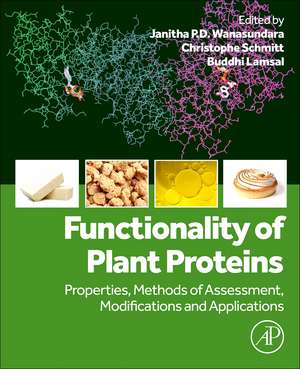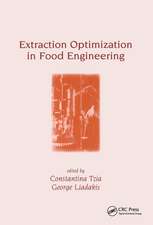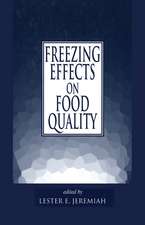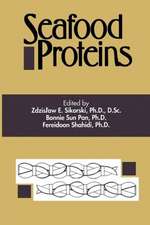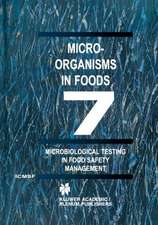Functionality of Plant Proteins: Properties, Methods of Assessment, Modifications and Applications
Editat de Janitha P.D. Wanasundara, Christophe Schmitt, Buddhi Lamsalen Limba Engleză Paperback – 24 iun 2024
Depending on the source and processing into ingredients, the ability of these proteins to satisfy techno-functional and nutritional requirements in the final food product may differ. Science-based knowledge is needed in the area of protein functionality for making decisions along the value chain, from production on the land to processing and formulation.
- Provides fundamentals of the properties that contribute to functionality (nutritional and techno-functional properties) of proteins in food systems and their relationship to protein molecular structure
- Describes fundamentals of the assessment of functional properties of protein with existing definitions and food systems
- Explores fundamentals of modification strategies employed to alter nutritional and techno-functional properties to enhance value of proteins in food
- Includes examples of plant protein-based products (in food systems) in which the role of nutritional and techno-functional properties is described
Preț: 968.85 lei
Preț vechi: 1262.69 lei
-23% Nou
Puncte Express: 1453
Preț estimativ în valută:
185.38€ • 193.58$ • 153.09£
185.38€ • 193.58$ • 153.09£
Carte tipărită la comandă
Livrare economică 08-22 aprilie
Preluare comenzi: 021 569.72.76
Specificații
ISBN-13: 9780323917216
ISBN-10: 0323917216
Pagini: 566
Dimensiuni: 191 x 235 x 31 mm
Greutate: 1.16 kg
Editura: ELSEVIER SCIENCE
ISBN-10: 0323917216
Pagini: 566
Dimensiuni: 191 x 235 x 31 mm
Greutate: 1.16 kg
Editura: ELSEVIER SCIENCE
Public țintă
Academics, Researchers, Students (Undergraduate, graduate), Research technicians, Ingredient developers, Food formulators, Ingredient marketers. Members of AOCS’ Analytical, Edible Applications, Processing and/or Protein and co-products divisionsCuprins
SECTION I. Proteins of plant sources and fundamentals of protein product development
1. Proteins of plant sources and fundamentals of protein product development
2. Processing of protein ingredients from plant sources
3. Functionality of plant proteins and importance of aggregation state
4. Probing structure-function relationship of proteins with molecular modeling
SECTION II. Methods of plant protein processing
5. Hydrodynamic properties I: Protein-water interactions; solubility, wettability, dispersibility, water binding/adsorption
6. Hydrodynamic properties II: Protein-water-Protein interaction; Viscosity and Gelation
7. The interfacial activity of plant proteins: theory, assessment and application in emulsion development
8. Hydrophobic/hydrophilic surface activity II: Foaming properties (air/water interface stabilization)
9. Hydrophobic/hydrophilic surface activity III: Interactions with other micro- and macro- molecules
10. Protein complexation with carbohydrates and lipids
11. Nutritional properties: Protein quality assessment parameters and methods
SECTION III. Functionality of proteins
12. Enzymatic modification of plant proteins: influence on functional properties, allergenicity, and bioactivity
13. Physical modification
SECTION IV. Protein functionality in food applications
14. Plant proteins for dry extruded products
15. Plant proteins for meat analogues
16. Plant proteins for dairy analogues
SECTION V. Challenges for plant-based protein ingredients and future path
17. Allergenicity of plant proteins
18. Anti-nutritional factors (ANFs) in protein-rich plant products: Chemistry, occurrence, nutritional implications, and their analysis
19. Challenges of plant protein processing and protein ingredient functionality assessment
1. Proteins of plant sources and fundamentals of protein product development
2. Processing of protein ingredients from plant sources
3. Functionality of plant proteins and importance of aggregation state
4. Probing structure-function relationship of proteins with molecular modeling
SECTION II. Methods of plant protein processing
5. Hydrodynamic properties I: Protein-water interactions; solubility, wettability, dispersibility, water binding/adsorption
6. Hydrodynamic properties II: Protein-water-Protein interaction; Viscosity and Gelation
7. The interfacial activity of plant proteins: theory, assessment and application in emulsion development
8. Hydrophobic/hydrophilic surface activity II: Foaming properties (air/water interface stabilization)
9. Hydrophobic/hydrophilic surface activity III: Interactions with other micro- and macro- molecules
10. Protein complexation with carbohydrates and lipids
11. Nutritional properties: Protein quality assessment parameters and methods
SECTION III. Functionality of proteins
12. Enzymatic modification of plant proteins: influence on functional properties, allergenicity, and bioactivity
13. Physical modification
SECTION IV. Protein functionality in food applications
14. Plant proteins for dry extruded products
15. Plant proteins for meat analogues
16. Plant proteins for dairy analogues
SECTION V. Challenges for plant-based protein ingredients and future path
17. Allergenicity of plant proteins
18. Anti-nutritional factors (ANFs) in protein-rich plant products: Chemistry, occurrence, nutritional implications, and their analysis
19. Challenges of plant protein processing and protein ingredient functionality assessment
